Don’t let your company get caught off guard by CVSA Brake Safety Week, August 25th to August 31st, 2024!
Shippers and carriers, mark your calendars! Brake Safety Week is soon approaching. This annual event aims to improve commercial vehicle safety and make our roadways safer, however it does impact those in logistics! Shippers and carriers alike can see disruption to their businesses. To keep your operations moving forward, it’s helpful to understand what Brake Safety Week entails and its effect on the overall freight market.
What is the CVSA? What is Brake Safety Week?
The Commercial Vehicle Safety Alliance (CVSA) is a non-profit organization dedicated to improving commercial motor vehicle safety through collaboration between law enforcement, industry stakeholders, and the public sector. In partnership with the Federal Motor Carrier Safety Administration (FMCSA), the CVSA launched its Operation Airbrake program in 1998. The goal of this initiative is to improve commercial vehicle brake safety and highway crashes due to faulty brake systems.
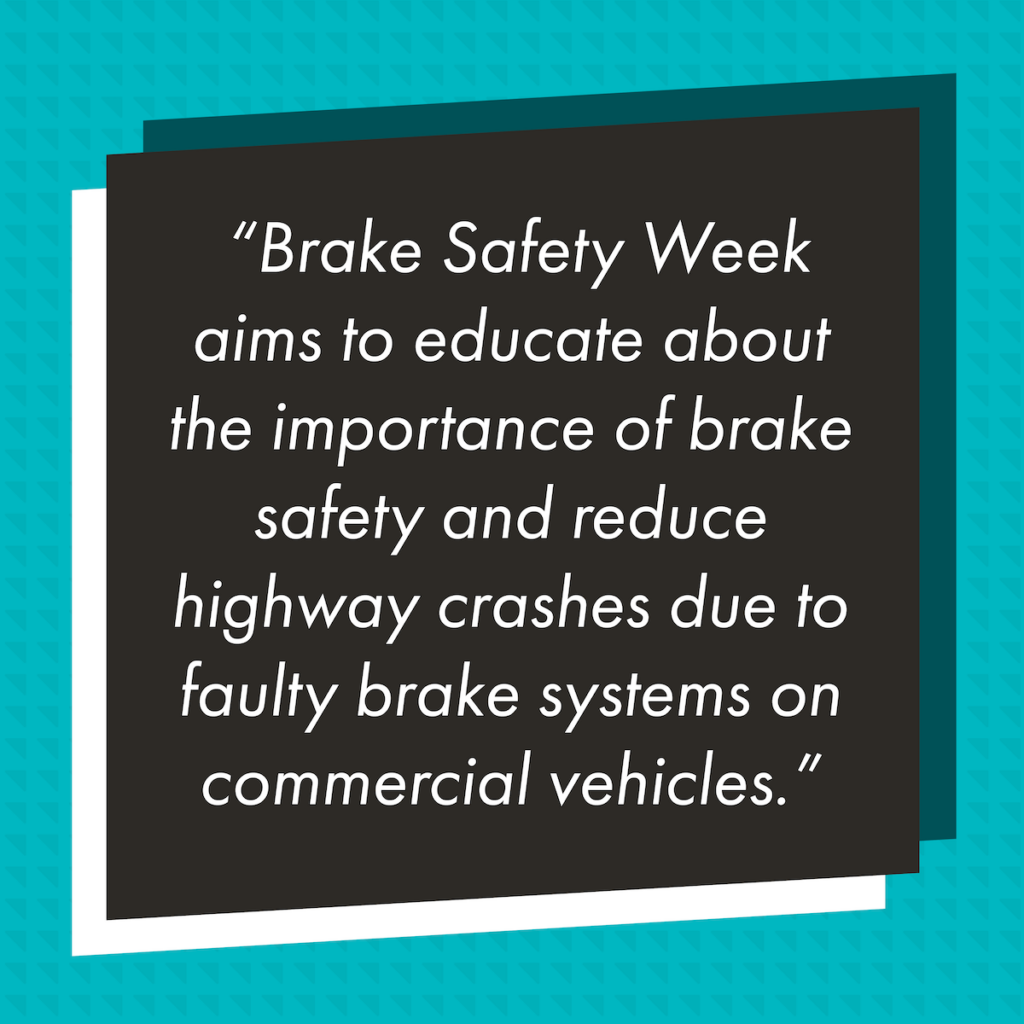
This initiative includes two annual events, Brake Safety Week and an unannounced one-day inspection event, that can happen at any time. During both events, commercial vehicle inspectors conduct brake safety inspections on large trucks and buses. The inspections take place across North America, so the U.S., Canada, and Mexico.
Brake safety is an important focus because brake-related concerns or issues are the largest percentage of out-of-service violations during roadside inspections. In fact, brake safety violations were the top vehicle violation at 25.2 percent of all out-of-service violations during last year’s International Roadcheck Event.
Each year has a primary focus surrounding brake safety, with this year’s being the condition of brake lining and pads. During roadside inspections, any commercial vehicles found to have brake-related out-of-service violations will be removed from the roadways until they can be corrected.
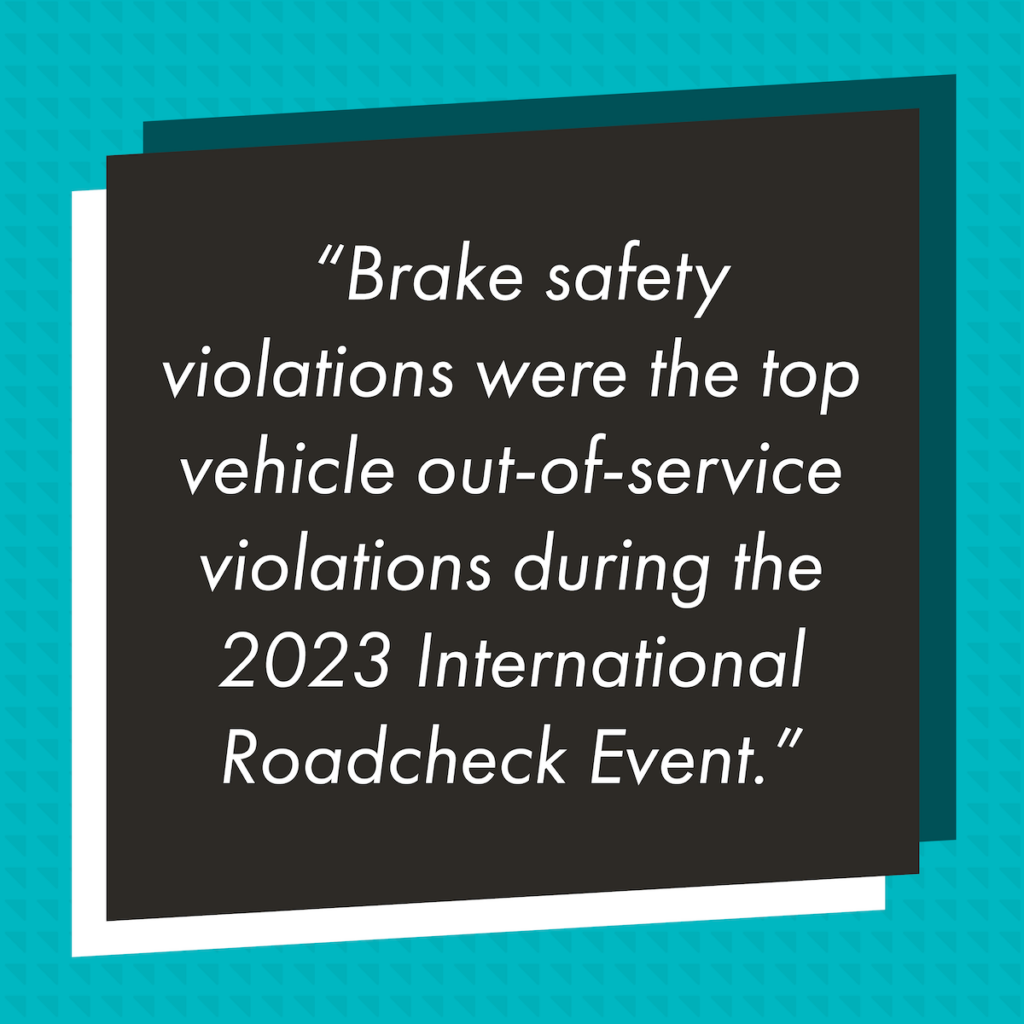
Brake Safety Week Inspection Procedure
These are the items the CVSA inspector will look over during your inspection:
- Driver’s license
- Registration
- Low air warning device
- Pushrod travel
- Brake linings/drums
- Air loss rate
- Tractor protection system
A typical inspection during Brake Safety Week will follow these steps:
- Check air brake mechanical components
- Check steering axle brake mechanical components
- Build the air pressure to 90-100 PSI
- Check brake adjustment
- Check the tractor protection system
- Check the air brake ABS system
- Test low air pressure warning device
- Test air loss rate
- Finalize paperwork and provide results to the driver
Why Should I Be Concerned About Brake Safety Week?
It’s important to be aware of when Brake Safety Week takes place because of the impact it has on shipping freight. Even though it’s just one week out of the year, no one likes to be unprepared for potential disruption or delays to their business.
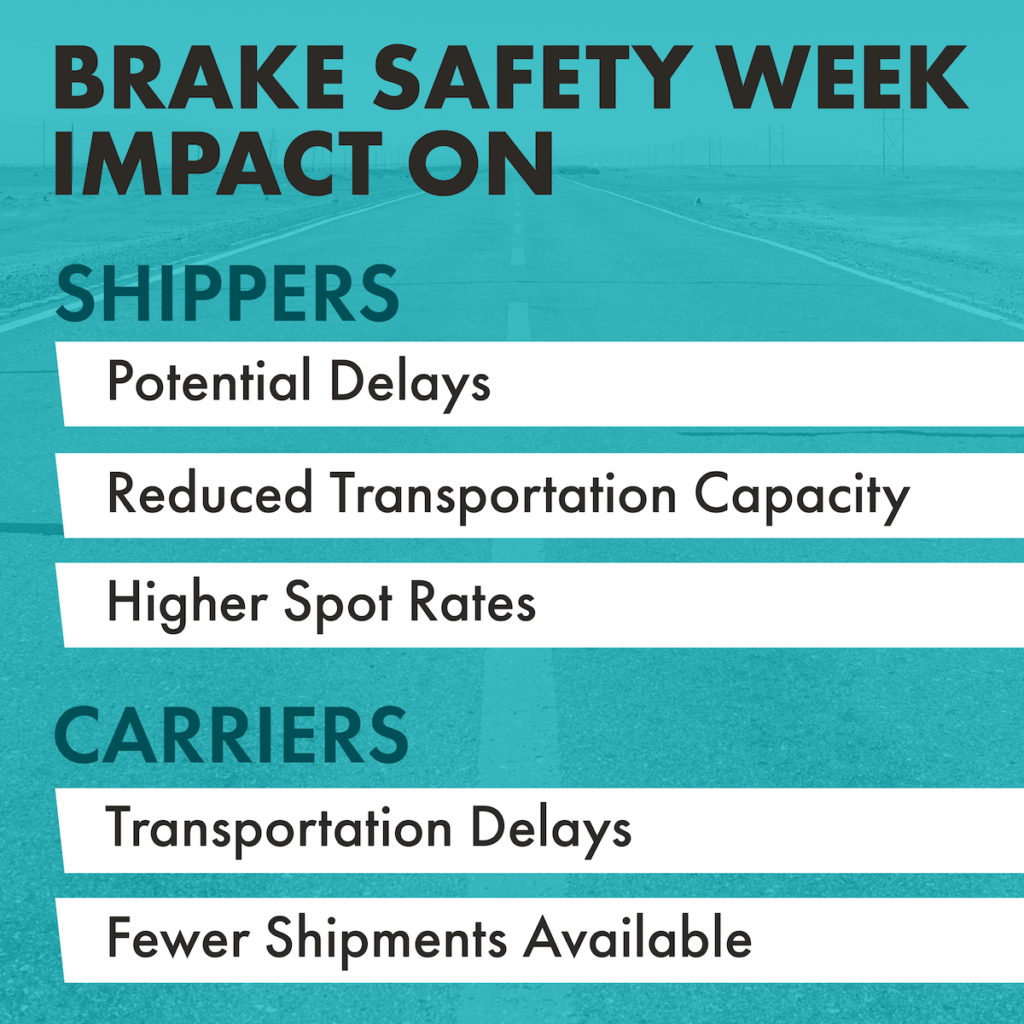
Brake Safety Week Impact on Shippers
Shippers may face potential delays, see reduced transportation capacity, and likely higher spot rates.
Potential Delays
There can be potential delays due to the brake safety inspections.
Reduced Transportation Capacity
The increased inspection effort sometimes leads carriers to strategically choose to close their business temporarily for the week to avoid any risk of fines or penalties. You might find it more difficult to secure reliable carriers for any last-minute shipments.
Higher Spot Rates
With the potential for fewer trucks available and delays, spot rates can be heightened during this time.
Brake Safety Week Impact on Carriers
Carriers are similarly affected, so there is the potential for delays and less freight volume.
Transportation Delays
Just like shippers, carriers should expect to see potential delays in the movement of traffic due to the increased inspections. This could disrupt your operations.
Fewer Shipments Available
Shippers may choose to plan around this week, reroute certain shipments, or even look into alternative modes. Less freight may be available during this week.
How to Prepare for Brake Safety Week:
Shippers
Ensure Documentation Accuracy
Double-check all shipment documentation. Ensure it is accurate and complete to avoid delays during any unexpected inspections.
Communicate Sensitive Shipment Needs
If you have any special requirements or time sensitivities, communicate this well in advance. This helps your logistics provider plan effectively. Any last-minute communication risks delays.
Find Alternatives
Consider alternative transportation modes or routes if you expect any delays.
Keep Customers Aware
Be proactive and communicate potential delays during this week to your customers to manage expectations.
Share Any Concerns
Discuss any concerns you might have with your logistics provider. They can offer valuable insights and help develop strategies to reduce disruptions.
Pricing Awareness
Be aware of possible higher spot rates during Brake Safety Week. When possible, plan shipments before or after this period to secure better pricing.
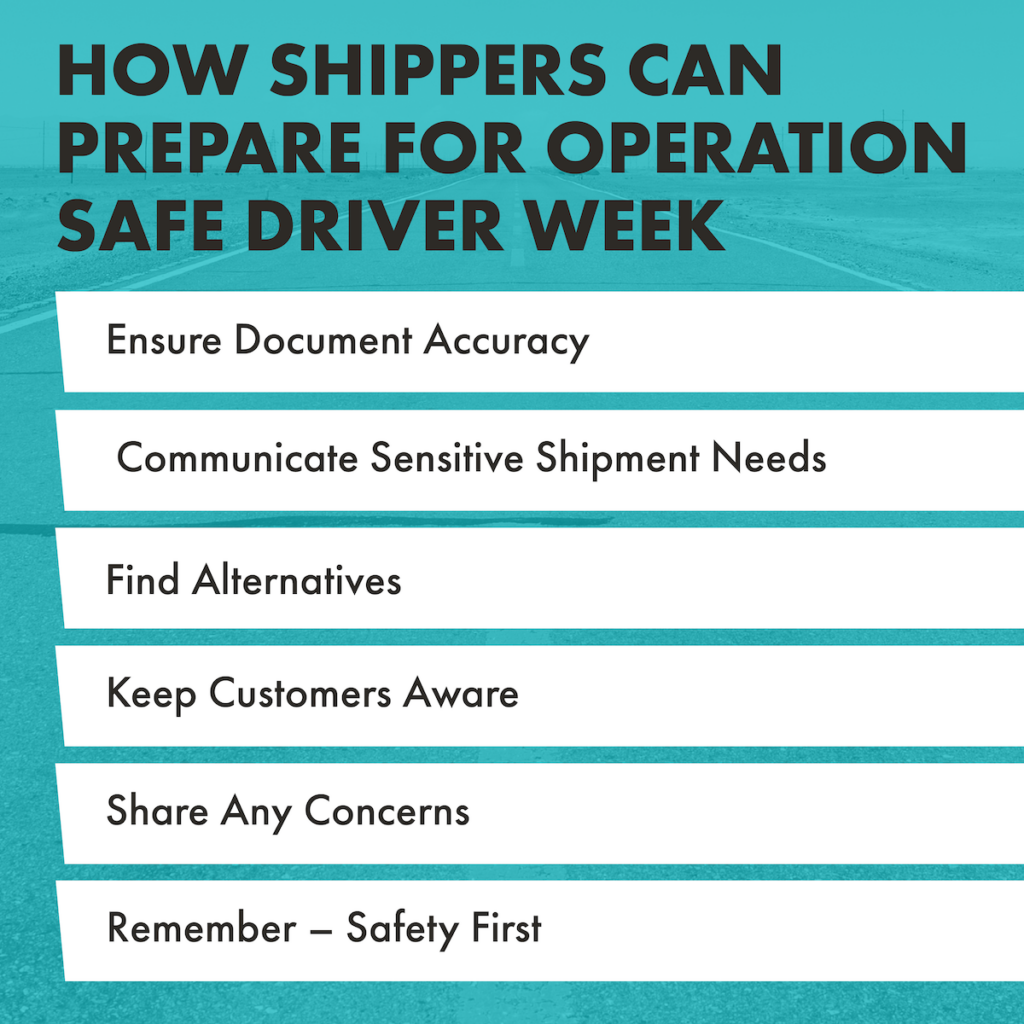
Carriers
Double-Check Credentials
Ensure all required credentials, like operating authority, hazmat endorsements, TWIC cards, and any other relevant permits, are current and accessible.
Driver Documents are Up to Date
Have drivers verify that all paperwork is up to date and accessible in case of inspection.
Vehicle Maintenance Check
Double-check that all vehicles have undergone any necessary preventive maintenance and are in top operating condition to avoid delays due to roadside repairs.
Prep Your Drivers
Make sure drivers are aware of this week and the potential for stops or delays. Train drivers on what to expect and the inspection procedure. Share this CVSA inspection checklist or tips sheet to help them improve their own brake maintenance checks. Make sure they know the channels to communicate any disruptions to their journey.
Book Ahead
Shippers may choose to reroute shipments, choose alternative modes, or plan around this week. Consider booking shipments well in advance for this week.
Remember – Safety First
The importance of this week is not disruptions but brake safety. This is a great time to remind drivers of their role in proper vehicle checks and maintenance.
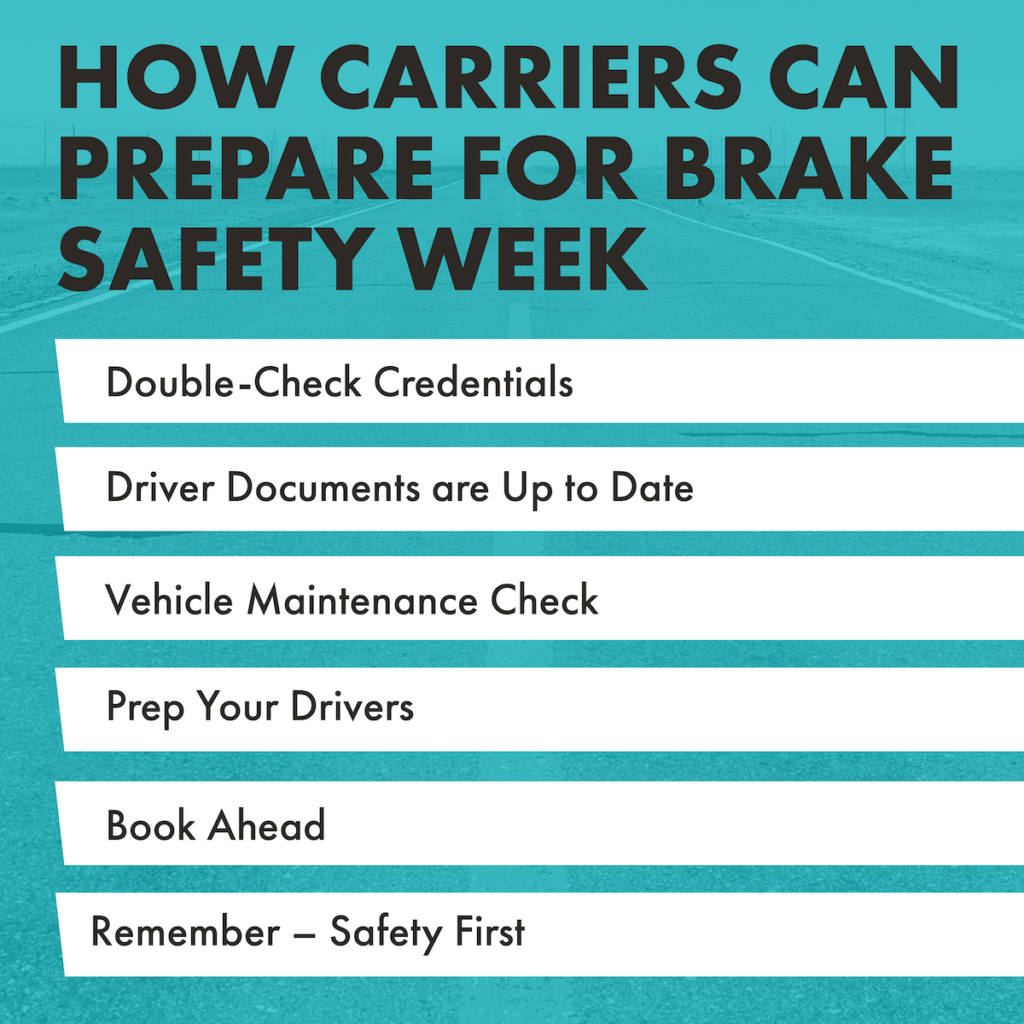
Let’s Work Together to Keep Our Roads Safe
We believe road safety is paramount. While Brake Safety Week might cause some temporary disruptions, it serves a vital purpose in keeping the importance of brake safety and its needed maintenance front of mind.
By staying informed and taking proactive steps, you can likely see minimal effects of Brake Safety Week.
For additional opportunities to stay ahead of disruption to your business during Brake Safety Week, consider working with Trinity Logistics. We have over 45 years of experience helping thousands of shipper and carrier companies conquer more complicated shipping situations, like CVSA inspection weeks. We’re confident in our ability to make this week (and all others) a painless one for your business.

Don’t let your company get caught off guard by CVSA Operation Safe Driver Week, July 7th to July 13th, 2024!
Shippers and carriers, mark your calendars! Operation Safe Driver Week is approaching. While this annual event is designed to make our roadways safer, it’s also a crucial week for those in logistics. This pivotal time can impact operational efficiency for shippers and carriers alike. To be prepared, it’s important for all those involved in shipping freight to understand what Operation Safe Driver Week entails and its effect on the freight market.
- What is the CVSA?
- What is Operation Safe Driver Week?
- Impact on Shippers
- Impact on Carriers
- How Shippers Can Prepare
- How Carriers Can Prepare
- Let’s Work Together
What is the CVSA? What is Operation Safe Driver Week?
The Commercial Vehicle Safety Alliance (CVSA) is a non-profit organization dedicated to improving commercial motor vehicle safety through collaboration between law enforcement, industry stakeholders, and the public sector. In partnership with the Federal Motor Carrier Safety Administration (FMCSA), the CVSA launched the Operation Safe Driver initiative in 2007. The goal of this initiative is to reduce the number of deaths and injuries from crashes involving large trucks, buses, and cars.
This initiative includes an annual event, Operation Safe Driver Week. It aims to improve driver behavior through education and increased enforcement efforts, focusing on unsafe driving behaviors. It takes place across North America, so the U.S., Canada, and Mexico. Unlike the CVSA’s other two initiatives (International Road Check and Brake Safety Week), which solely focus on commercial drivers, this event affects all drivers on the road.
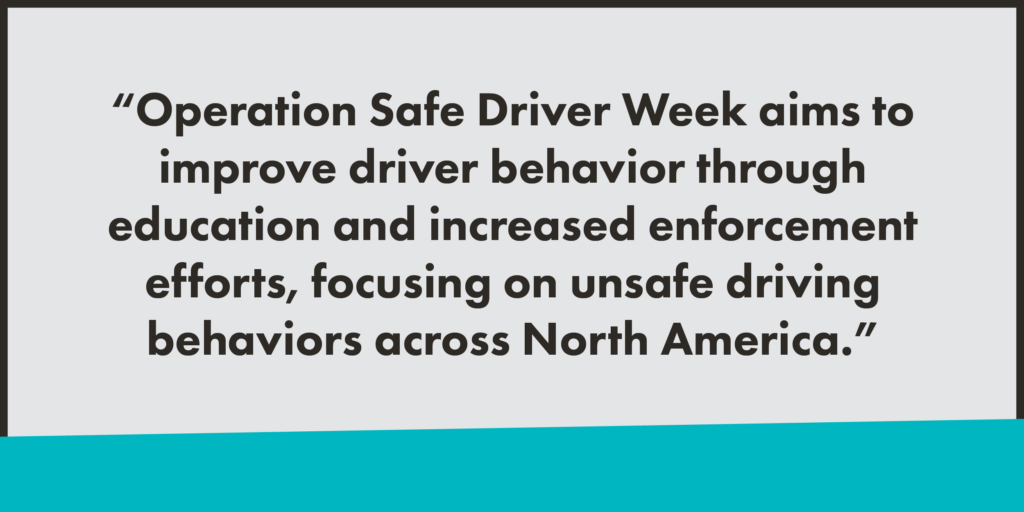
Each year has a primary focus with this year’s being reckless, careless, or dangerous driving. This includes actions like:
- Speeding
- Texting while driving
- Drunk or drugged driving
- Following too closely
- Driving too aggressively
- Improper lane changes
- Failure to obey traffic control devices
- Failing to use a seat belt
Those drivers identified are pulled over by law enforcement and issued warnings or citations.
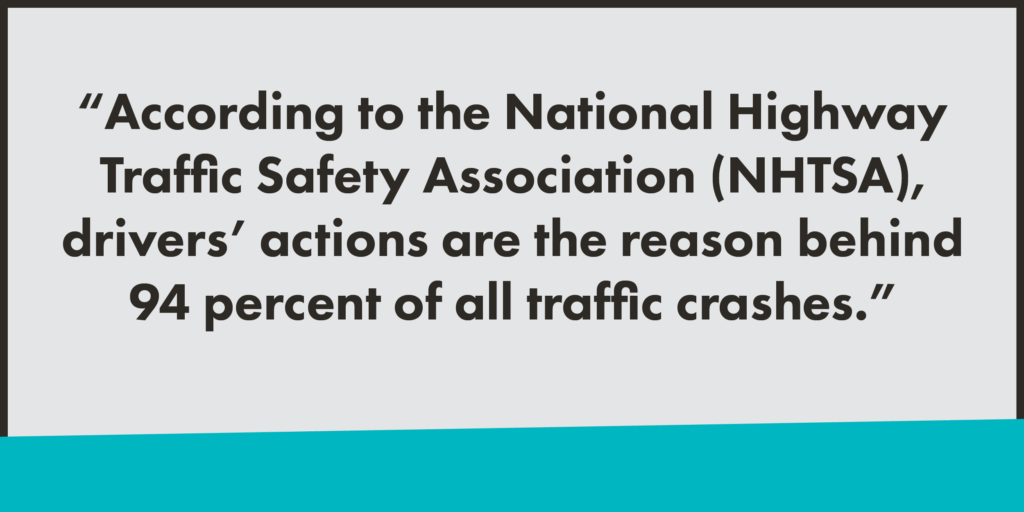
According to the National Highway Traffic Safety Association (NHTSA), drivers’ actions are the reason behind 94 percent of all traffic crashes. Research from the University of Missouri-Columbia has shown that interactions with law enforcement, not just education, are what brings change. During last year’s event, law enforcement interacted with 66,421 drivers! Drivers were informed and educated on how they can improve their driving behavior and do their part in reducing crashes.
Why Should I Be Concerned About Operation Safe Driver Week?
It’s important to be aware of when Operation Safe Driver Week takes place because of the impact it has on shipping freight. Even though it’s just one week out of the year, no one likes to be unprepared for potential disruption or delays to their business.
Operation Safe Driver Week Impact on Shippers
Shippers may face potential delays, see reduced transportation capacity, and likely higher spot rates.
Potential Delays
Increased enforcement activity can lead to potential delays due to any road stop inspections or pullovers.
Reduced Transportation Capacity
The increased enforcement effort sometimes leads carriers to strategically choose to close their business temporarily for the week to avoid any risk of fines or penalties. You might find it more difficult to secure reliable carriers for any last-minute shipments.
Higher Spot Rates
With the potential for fewer trucks available and delays, spot rates can be heightened during this time.
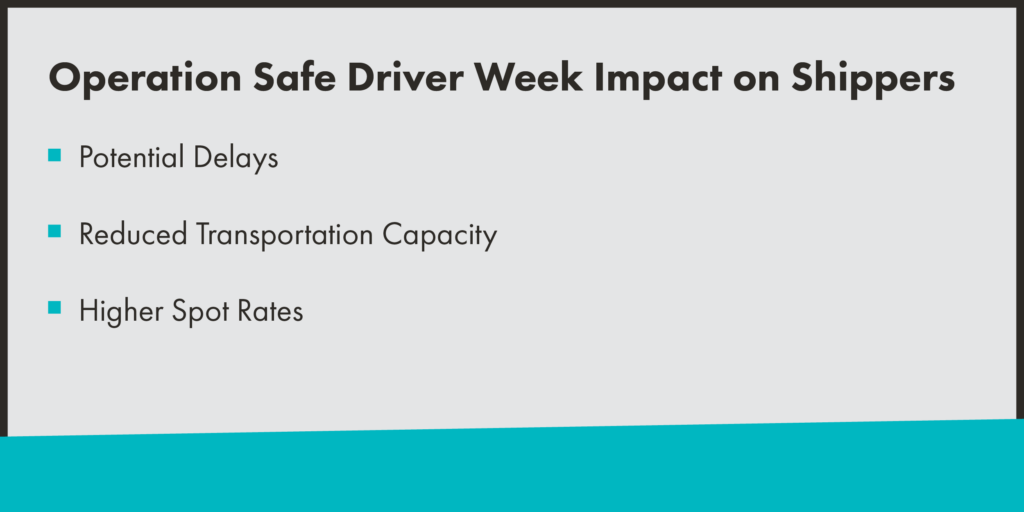
Operation Safe Driver Week Impact on Carriers
Carriers are similarly affected, and there is the potential for delays, less freight volume, and higher scrutiny from law enforcement.
Transportation Delays
Just like shippers, carriers should expect to see potential delays in the movement of traffic due to the increased enforcement. This could disrupt your operations.
Fewer Shipments Available
Shippers may choose to plan around this week, reroute certain shipments, or even look into alternative modes. Less freight may be available during this week.
Increased Law Enforcement
Expect to see increased law enforcement, so more eyes will be looking for unsafe driver behavior, and drivers may receive fines.
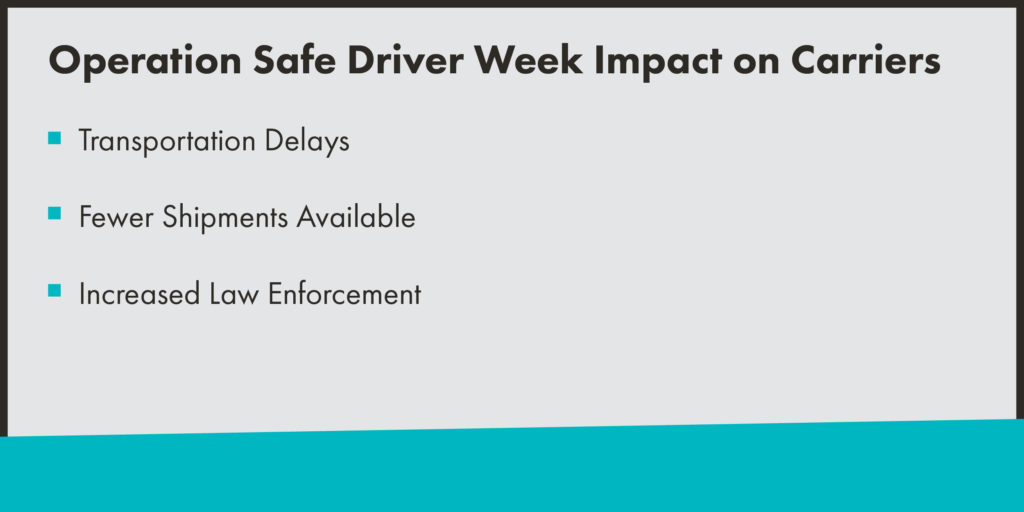
How to Prepare for Operation Safe Driver Week:
Shippers
Ensure Documentation Accuracy
Double-check all shipment documentation. Ensure it is accurate and complete to avoid delays during any unexpected inspections.
Communicate Sensitive Shipment Needs
If you have any special requirements or time sensitivities, communicate this well in advance. This helps your logistics provider plan effectively. Any last-minute communication risks delays.
Find Alternatives
Consider alternative transportation modes or routes if you expect any delays.
Keep Customers Aware
Be proactive and communicate potential delays during this week to your customers to manage expectations.
Share Any Concerns
Discuss any concerns you might have with your logistics provider. They can offer valuable insights and help develop strategies to reduce disruptions.
Pricing Awareness
Be aware of possible higher spot rates during Operation Safe Driver Week. When possible, plan shipments before or after this period to secure better pricing.
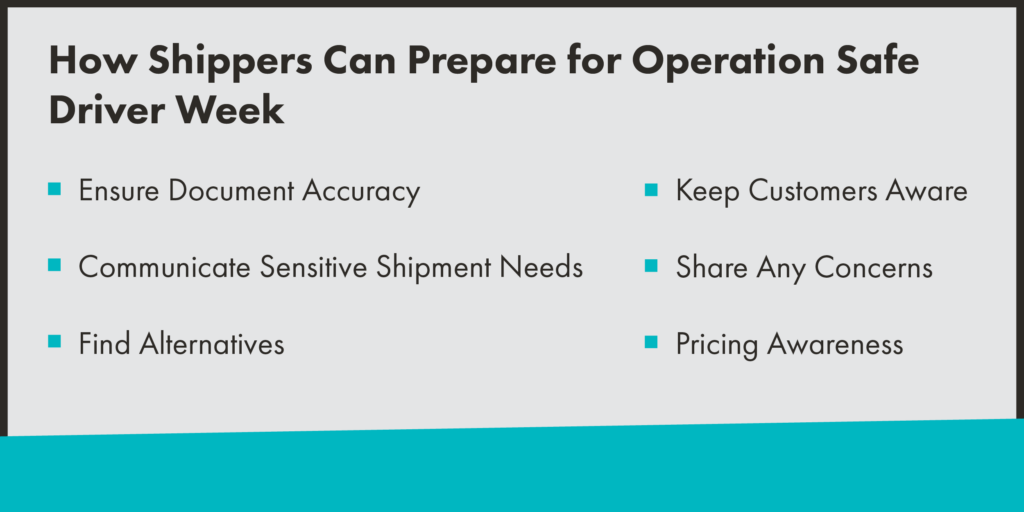
Carriers
Double-Check Credentials
Ensure all company credentials, like operating authority, hazmat endorsements, TWIC cards, and any other relevant permits, are current and accessible.
Driver Documents are Up to Date
Have drivers verify that all paperwork is up to date and accessible in case of inspection.
Vehicle Maintenance Check
Double-check that all vehicles have undergone any necessary preventive maintenance and are in top operating condition to avoid delays due to roadside repairs.
Prep Your Drivers
Make sure drivers are aware of this week and the potential for stops or delays. Train drivers on proper procedures for interacting with law enforcement. Make sure they know the channels to communicate any disruptions to their journey.
Book Ahead
Shippers may choose to reroute shipments, choose alternative modes, or plan around this week. Consider booking shipments well in advance for this week.
Remember – Safety First
The importance of this week is not disruptions but road safety. This is a great time to talk with drivers about safe driving behavior. You could also help educate the public on proper driving behavior when interacting with trucks. Remember, this week benefits everyone who shares the road.
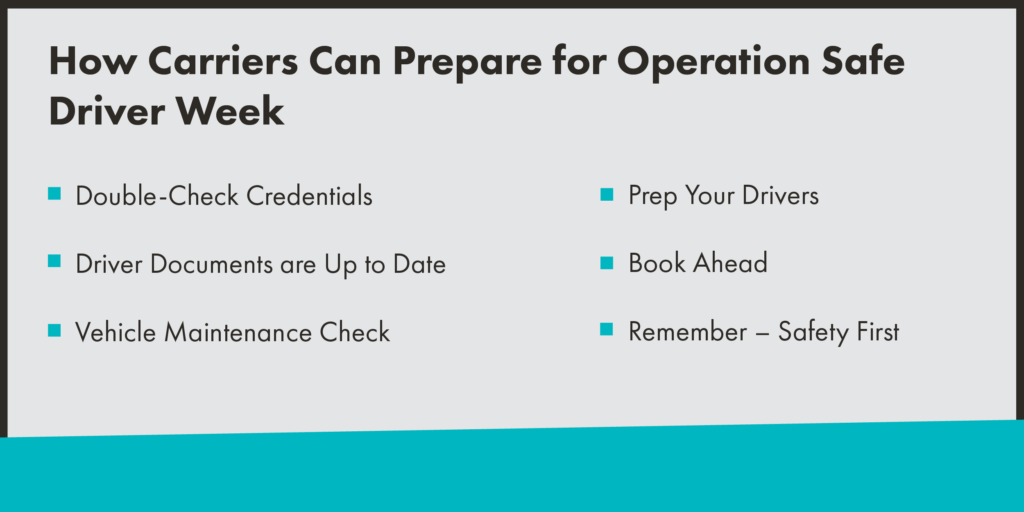
Let’s Work Together to Keep Our Roads Safe
We believe road safety is paramount. While Operation Safe Driver Week might cause some temporary disruptions, it serves a vital purpose in promoting safe driving behaviors.
By staying informed and taking proactive steps, you can likely see minimal effects of Operation Safe Driver Week.
For additional opportunities to stay ahead of disruption to your business during Operation Safe Driver Week, consider working with Trinity Logistics. We have over 45 years of experience helping thousands of shipper and carrier companies conquer more complicated shipping situations, like CVSA inspection weeks. We’re confident in our ability to make this week (and all others) a painless one for your business.
